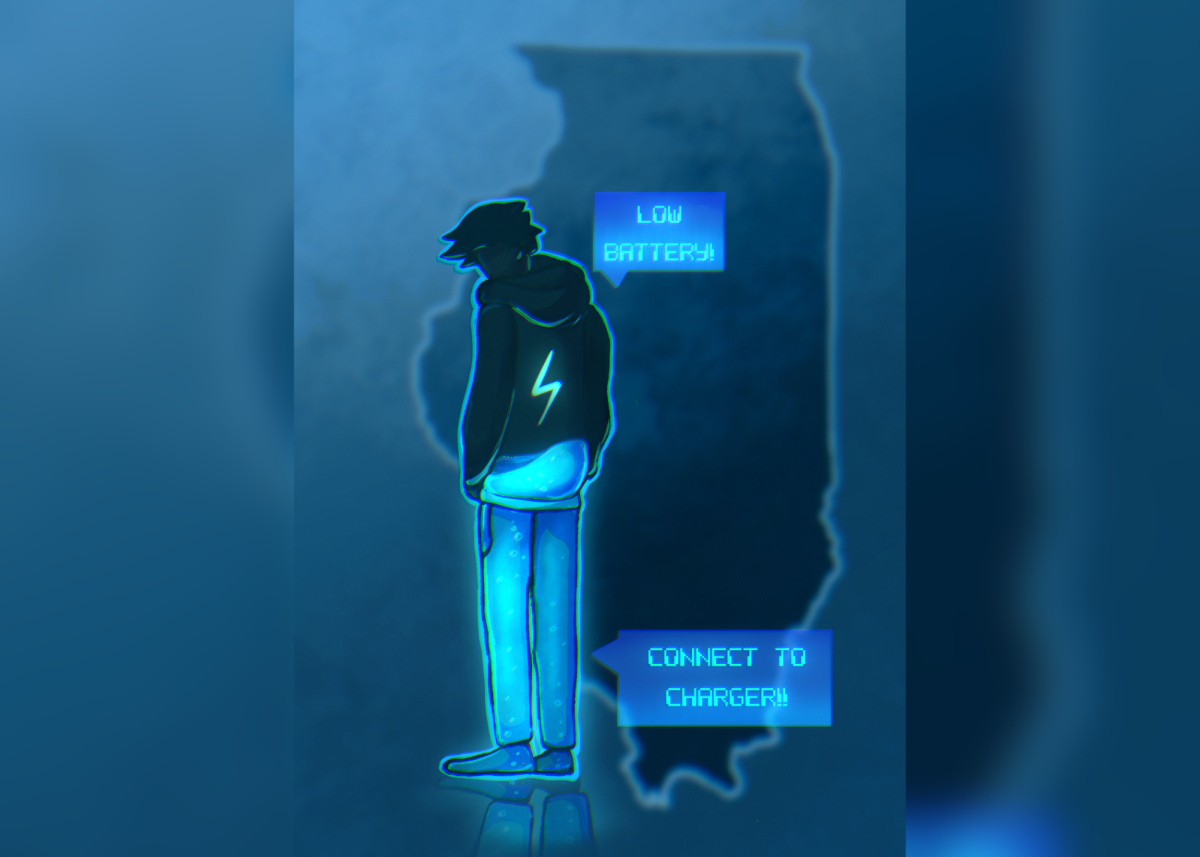Mental health is a prevalent issue worldwide, but a recent study shows that depression rates in Illinois are on the rise.
“According to the second edition of Best & Worst States for Millennials, a study that examines depression diagnosis rates among millennials in all 50 states, [those] in Illinois have increased depression rates by 19% this year compared to 2022, making the state the number six place where this generation’s mental health have worsened,” Abigail Da Costa, PR Executive of Scholaroo, wrote in an email.
Illinois ranked No. 12 in Quality of Life and No. 22 overall among best states to live in for Millennials. However, WalletHub ranked Illinois fifth in the latter category the previous year.
Advertisement
In fact, U.S. News and World Reporter Elliott Davis, Jr. wrote in a May 2022 article, “They [millennials] see the lowest rates of depression in Hawaii and Illinois.”
So why is mental health worsening in Illinois? Morgan Gant, a psychiatric nurse practitioner, said limited access to resources has played a part.
“I think one reason is access to services, especially in rural Illinois. I mean, even in urban [areas], it’s still pretty bad,” she said.
Gant has worked for Integrated Health of Southern Illinois for 13 years now. The health care center has two locations, one in Carterville and one in Harrisburg, and offers numerous services, including family medicine, physical therapy, massage therapy, mental health and more.
“I have definitely seen, not just over the course of this past year, but over the past 13 years, patients coming to me in a much worse state than they were 13 years ago,” she said.
Gant said the cost of living and low availability of jobs make services less affordable. However, most people have limited to no knowledge about resources offered to begin with. A small, non-scientific survey conducted by the Daily Egyptian found that 46.5% of participants are not aware of services in southern Illinois and 23.3% are only slightly aware.
“I think a lot of people in this area don’t know where to go for services, or depending on their insurance, the wait for services can be incredibly high,” Gant said. “If you need services, and don’t know where to get them, or can’t access them, or say you’re in a crisis right now, and you want services, and it’s gonna be three months before you can see someone…by that point people just kind of fall out of [trying]. They don’t even bother. They’re like, ‘What’s the point?’”
Advertisement*
Millennials are defined as anyone born between 1981 and 1996, which puts the youngest among the generation at age 27. Despite Scholaroo’s data, young adults still appear to be the age group most impacted by mental health issues, or at least the age group most likely to report these issues. The Census Bureau’s Household Pulse Survey found that one-third of adults struggle with anxiety and depression. Of that one-third, 50% of reported anxiety and depression symptoms were documented in young adults ages 18-24.
In the Daily Egyptian poll, 81.4% of participants said they also struggle with anxiety or depression.
Participants were asked why they believe young adults are more likely to struggle with their mental health. Several mentioned generational trauma and transitioning into adulthood.
“Older generations put stress on younger generations to be better than they were, which creates a cycle of pressure,” sophomore Penny Bordewick said.
Freshman Roman Chambers wrote, “I think it’s because they’re expecting to fill a role as an adult, but they don’t fully know what to expect or what to do to fill that role, especially since it’s the first time in their life that they’re having full freedom over their actions.”
Gant said that pressures from social media may also play a part.
“I think a lot of it is just stress and demands and the constant access that we have to technology and how that impacts our brains,” she said. “…I think [it is] the same with college students. People have access to us constantly…we don’t ever have downtime, fully.”
On a more positive note, Gant noted that the COVID-19 pandemic has made mental health resources more accessible.
“It [the pandemic] has really changed mental health for the better as far as services because of the availability of telehealth,” she said. “That was not a thing my practice offered. I had never even considered offering telehealth prior to the pandemic, but I was forced to do it because that was the only option. And now I can’t imagine life without it. It has increased my ability to serve so many more patients. And patients prior to the pandemic would have to take off work or miss classes…to come in for services. Now, we can simply just connect on video and they can be wherever.”
To improve mental health in Illinois, Gant suggests having more preventative care: “Letting people know where the services are available and how to get them and improving early detection, [such as] screenings.”
She said one of the biggest ways to help someone who is struggling with their mental health is to normalize accessing care.
“See if they’re willing to talk to someone, and maybe help them get connected with services, or at least help them get connected with something on campus,” she said. “At most primary care facilities, if you can get in to see a general practitioner, they can always refer you [elsewhere]. Sometimes it’s just getting that step, like encouraging them or going with them, even saying, ‘Hey, I’ll go with you to the Student Health Center if you want to talk to someone, or I’ll go with you to campus mental health, or I’ll run with you to this appointment.’”
SIU’s campus offers several mental health services.
The mission of Counseling and Psychology Services (CAPS), as stated by its website, is to “provide mental health-related services to facilitate students’ adjustment to college and their personal and psychological growth in becoming high-functioning and socially responsible adults.” Students can schedule an appointment by calling 618-453-5371. They can also meet the CAPS Counselor on Duty by visiting the office on the second floor of the Student Health Center Monday through Friday from 8 a.m. to 4:30 p.m.
Higher Education Resources and Opportunities for Salukis in Need (HEROES) is also a program located in the Student Health Center. HEROES provides support, guidance and advocacy to students struggling with financial challenges, including housing/food insecurity and access to healthcare, transportation, childcare, clothing, personal care items and school necessities. To learn more about the program or request assistance, visit its website.
If you or someone you know is struggling, you can send in a referral to Saluki Cares. Its website states that it is an “early alert initiative” and “a University-wide program of care and support for students in distress.” The program also offers the Saluki Cares Emergency Fund. Students impacted by a financial emergency or catastrophic event can apply via its online application form.
Southern Illinois Healthcare and Centerstone also offer behavioral health services off-campus.
As for Integrated Health, Gant mentioned that it has three, and soon-to-be four, psychiatric nurse practitioners, who do medication management, diagnosis and treatment. They also work with patients who want dietary/nutritional help rather than prescription medication.
“You do not have to have a referral from a family physician or anything like that. You can do self-referral, just by calling the office and saying you want to self-refer,” she said. “When someone comes in and sees one of us, we do a full assessment; look at the symptoms and history, talk about what meds they may have tried in the past…anything like that.”
Integrated Health also offers talk therapy.
“We have therapists that specialize in cognitive behavioral therapy, trauma-informed care, trauma processing and reprocessing therapy,” she said. “We [also] have therapists who have specialties in LGBTQ populations.”
Neurofeedback is a service that Integrated Health only recently started offering. Gant said it “helps people learn to better read their body signals” and helps “train their body to respond to stress differently.”
“Neurofeedback is basically kind of a way to retrain your brain, and it helps with a lot of different things,” she said. “It’s good for just general stress and anxiety management, focus and attention. Some people use it for a kind of performance enhancement with sports to help with focus in that area.”
To make an appointment you can call or text the main line, 618-985-4344 for Carterville and 618-252-5555 for Harrisburg. For more information on mental health or other services, visit Integrated’s website.
Advertisement











